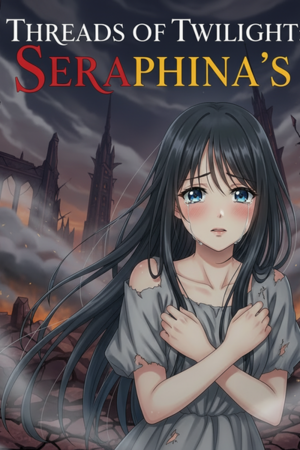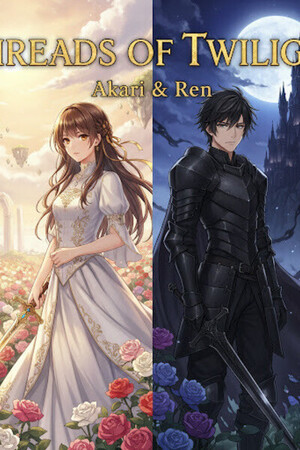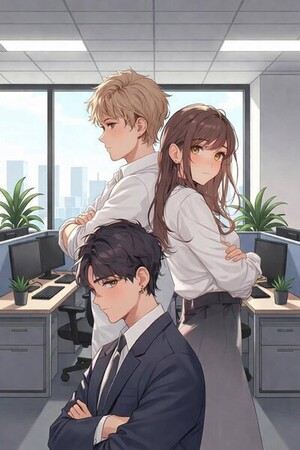Chapter 4:
The Flight
Threads of Twilight: Seraphina's
The narrow service corridors had saved her, a secret circulatory system of stone and shadow that had allowed her to bypass the worst of the arterial bloodshed. But they were not a path to safety; they were merely a different, quieter kind of tomb. Seraphina emerged from a final, cramped passage behind a stack of provision crates, stumbling out into the chaos of the Citadel’s grand promenade, a wide, once-beautiful avenue that was now the primary artery of the exodus.
The scene was a portrait of a world’s end, a writhing, screaming mass of humanity stripped of its holy composure. The air was a thick, choking soup of smoke, fear-sweat, and the bitter scent of burning faith. Here, there were no duels between champions of light and shadow, only the raw, ugly, and indiscriminate chaos of a panicked herd. People ran, their fine white and gold robes trampled into the grime, their faces blank masks of primal terror. They shoved, they screamed, they fell. Seraphina saw a priest, his face contorted in a silent, weeping prayer, get knocked to the ground by the surging crowd, his body disappearing under a wave of frantic, running feet. No one stopped. No one looked back.
She clutched Jophiel tighter, the small, silent weight of him tied to her chest a constant, terrifying, and grounding presence. She had fashioned a crude sling from a bolt of altar cloth she’d found in a ruined chapel, securing him to her body so her arms would be free. He was a dead weight, his head lolling against her shoulder, his small body utterly limp. But his eyes were wide open, two dark, bottomless pools that silently, unblinkingly drank in the horror, recording every scream, every fall, every lick of flame. He was a living repository of their world’s final, agonizing moments.
A group of guardsmen, their formations broken, tried to impose a semblance of order, their voices raw and cracking as they shouted commands that were swallowed by the din. "To the lower aqueducts! Form a line! Women and children first!" But their authority was gone, their white-gold armor no longer a symbol of divine power but just another uniform in a dying city. A desperate man, his face wild with terror, tried to steal a horse from a knight, and was cut down with a swift, merciless strike. A family, hobbled by their elderly, infirm grandmother, was simply left behind, the tide of humanity parting around them like a river around a stone, their pleas for help lost in the greater wail of the city.
This was Zion in its truest, most naked form, stripped of its psalms and its self-righteous certainty. It was just people. Scared, selfish, and desperate people.
Through the churning chaos, Seraphina saw a beacon of impossible hope. It was a massive, sturdy horse-drawn carriage, the kind a wealthy merchant might use to transport fine silks or spices. Its four powerful horses, their eyes wide with terror, were being calmed by a large, balding man with a kind face and a booming, steady voice that managed to cut through the panic.
"This way! To the carriage!" the merchant roared, his voice an anchor of sanity in the storm. "I know the way down the old western pass! There is room! We can make it if we stay together!"
It was a lie—the carriage was already crowded, its wooden sides bulging with a desperate cargo of refugees—but it was a noble lie. Hope, fragile and desperate, surged through Seraphina. A path. A guide. She pushed through the crowd, her body a small, desperate wedge, shielding Jophiel with her own frame, ignoring the elbows and fists that battered her. "Please," she begged, her voice a raw, broken thing, as she reached the side of the carriage. "My brother… he's just a child."
The merchant looked down, his kind eyes taking in her torn robes, her bloodied hands, and the small, silent, wide-eyed boy strapped to her chest. His face softened with a pity that was so genuine, so achingly human, it almost broke her. "Here, child," he said, reaching down a thick, strong hand. "Give me the boy first."
He lifted Jophiel into the carriage as if he weighed nothing, passing him to a weeping woman inside, before hauling Seraphina up with a single, powerful pull. She collapsed into the cramped space, the press of warm, terrified bodies a strange and claustrophobic comfort. For a single, breathless moment, she felt a flicker of something she had thought was lost to her forever: a chance.
The carriage lurched into motion, its iron-rimmed wheels groaning and clattering on the cracked marble. The new vantage point gave her a sickening, panoramic view of the chaos. She saw a group of refugees, their path blocked by a Fallen raiding party, simply turn and leap from the edge of the promenade, choosing a swift death on the rocks below over the certainty of the invaders' blades. The city was dying, and they were a single, fragile ark in a drowning world.
The hope was a short-lived, beautiful, and cruel illusion. The carriage, a symbol of salvation for those aboard, was a symbol of bitter resentment for the dozens left behind. A group of men, their faces hard with a desperate, feral cunning, broke from the running mob and swarmed the driver's seat.
"The pass is too slow, old man!" one of them snarled, grabbing the merchant's arm. "The main road is faster! We're not dying on this mountain because of your cowardice!"
"The main road leads to the Vale of Gehenna," the merchant argued, his voice tight with a new, fearful urgency as he tried to bat the men away with his free hand. "The bulk of their army is there! It is a death trap! The western pass is our only—"
He never finished the sentence. A cruel, sharp knife, held in the hand of one of the men who had been clinging to the side of the carriage, flashed in the firelight. It plunged into the kind merchant's side with a soft, wet thud. The merchant’s eyes went wide, not with anger, but with a look of pure, shocked betrayal. He looked down at the knife in his gut, then back at his attacker, a silent question on his lips. Then he slumped forward, falling from his seat to be instantly trampled under the hooves of his own panicked horses.
A collective, high-pitched scream erupted from the refugees in the carriage, a sound of fresh, immediate horror. The chaos that had been outside was now inside, a storm of flailing limbs and terrified shouts as the hijackers took the reins, whipping the horses into a frantic, uncontrolled gallop. The carriage bucked and swayed violently, throwing its passengers against one another.
Jophiel, who had been a silent, limp weight against her, began to tremble, a low, guttural, and animalistic whimper of pure terror escaping his lips for the first time since their home had collapsed. The sound, a testament to a trauma so deep it had finally broken through his catatonia, shattered what little remained of Seraphina's own composure.
She pulled him tight, burying his face in her shoulder, her own body a shield against the screaming, terrifying world. And she began to sing.
Her voice was a thin, reedy, and trembling thing, a fragile whisper against the roar of the fire and the screams of the panicked refugees. It was their childhood lullaby, the one her mother had sung to them on nights when the mountain storms had raged, a simple, gentle song about a single, shining star that never wavered, a star you could always find, no matter how dark the night.
"Twinkle, twinkle, little star," she sang, her voice cracking on the familiar words, her tears now falling freely, splashing onto Jophiel's tangled hair. "How I wonder what you are."
The song was a desperate, insane act in the face of such overwhelming horror. It was a prayer to a god she no longer believed in, a memory of a peace that was now a ghost. She sang to block out the screams, to block out the crackle of the flames, to block out the memory of the kind merchant's shocked, dying eyes. She sang for Jophiel, a desperate attempt to pull him back from the edge of the abyss he was staring into. And she sang for herself, a mantra to hold onto the last, tattered shreds of her own sanity.
The reactions from the others in the carriage were a microcosm of their broken world. A hardened-looking man near the front, a former city guard by his tattered uniform, shot her a look of pure, venomous contempt. "Be silent, girl," he snarled. "Your noise will draw them to us."
But a young mother, clutching her own crying infant on the other side of the carriage, met Seraphina’s gaze with eyes full of a shared, terrible understanding. The mother began to hum along, her own voice a low, mournful counterpoint to Seraphina’s, the two of them weaving a fragile, heartbreaking harmony of maternal desperation in the heart of the chaos. A wounded knight, his arm in a crude sling, simply closed his eyes, a single tear tracing a path through the grime on his cheek, the simple melody a painful, beautiful reminder of a world he was now certain he would never see again.
Jophiel's trembling did not stop, but the raw, animalistic whimpering subsided, replaced by a profound, shuddering silence. He was still lost, still broken, but a part of him, a deep and forgotten part, heard her.
The carriage thundered on, its new masters whipping the horses into a reckless, suicidal speed. They were no longer following a path; they were fleeing. The grand promenades gave way to narrower, winding service roads that clung to the outer edge of the mountain. Twice, they nearly went over the edge, the carriage tilting at a sickening angle, sending screams of fresh terror through its passengers.
Finally, the frantic, panicked flight slowed. The carriage ground to a halt, the horses panting, their sides heaving, their coats slick with sweat and foam. They had reached a fork in the road.
One path, narrow and treacherous, led steeply downwards into a dark, mist-filled chasm. The other, wider and more gently sloped, curved back towards the burning heart of the city they had just fled. The man who had taken the reins, the leader of the hijackers, stared at the two paths, his face a mask of sudden, dawning, and idiotic confusion.
"Which way?" he demanded, turning to the others in the carriage. "Which way is down?"
A wave of horrified, disbelieving silence fell over the refugees. The man who had murdered their guide, who had seized their ark in a desperate act of self-preservation, had no idea where he was going.
An argument erupted, a chaotic, useless babble of panicked shouts.
"The steep path! It must lead down!"
"No, you fool, that's a quarry road! It leads to a cliff!"
"We must go back! The lower aqueducts were the rally point!"
"The aqueducts are a death trap! The Fallen will have collapsed them by now!"
They were lost. A single, fragile vessel of humanity, adrift on a burning mountain, with no captain, no map, and no hope. The sounds of the battle, which had seemed so distant, were growing louder again, a low, ominous rumble from the valleys below and the city above. They were no longer fleeing. They were a stationary, terrified, and very conspicuous target.
Seraphina clutched her silent brother, the final, hopeful notes of the lullaby dying on her lips. She looked from one unfamiliar, treacherous path to the other, then at the arguing, terrified faces of the people who had murdered their only guide. She had escaped the dungeons. She had escaped the fires. She had escaped the battle. Only to end up here, trapped in a new kind of hell, one they had made for themselves.




Please sign in to leave a comment.